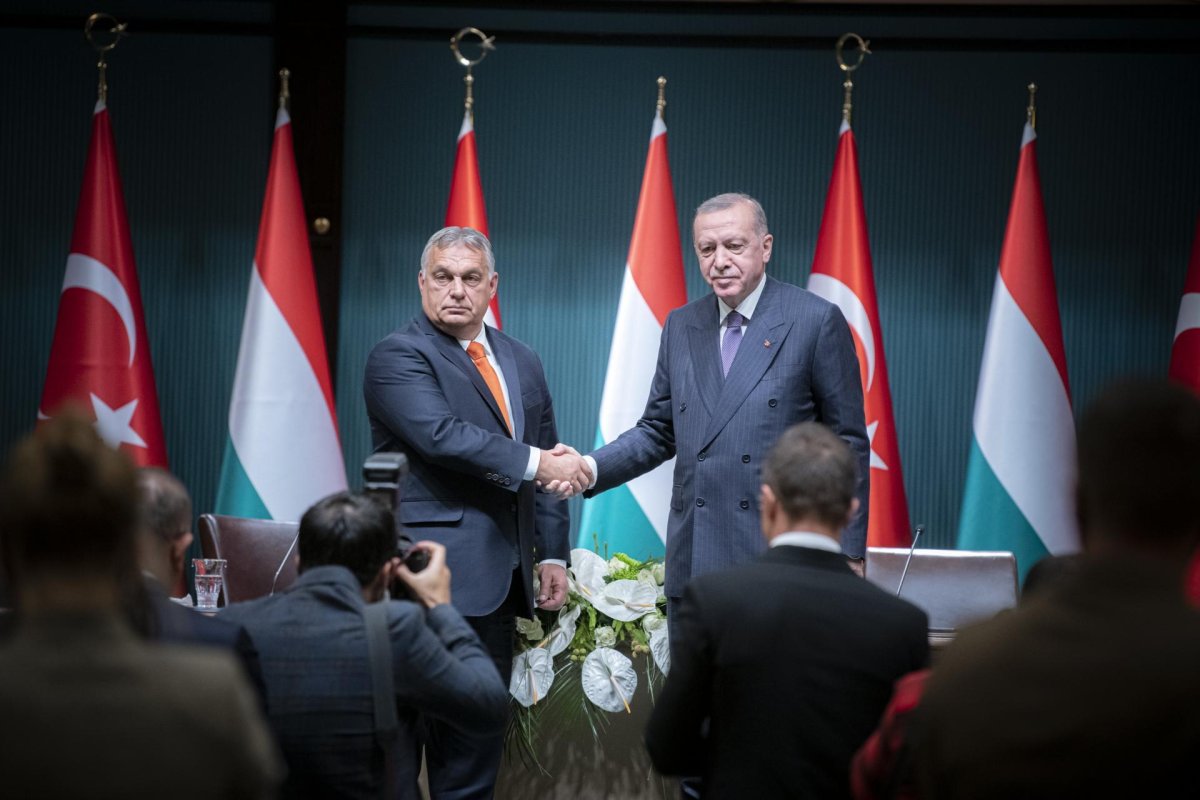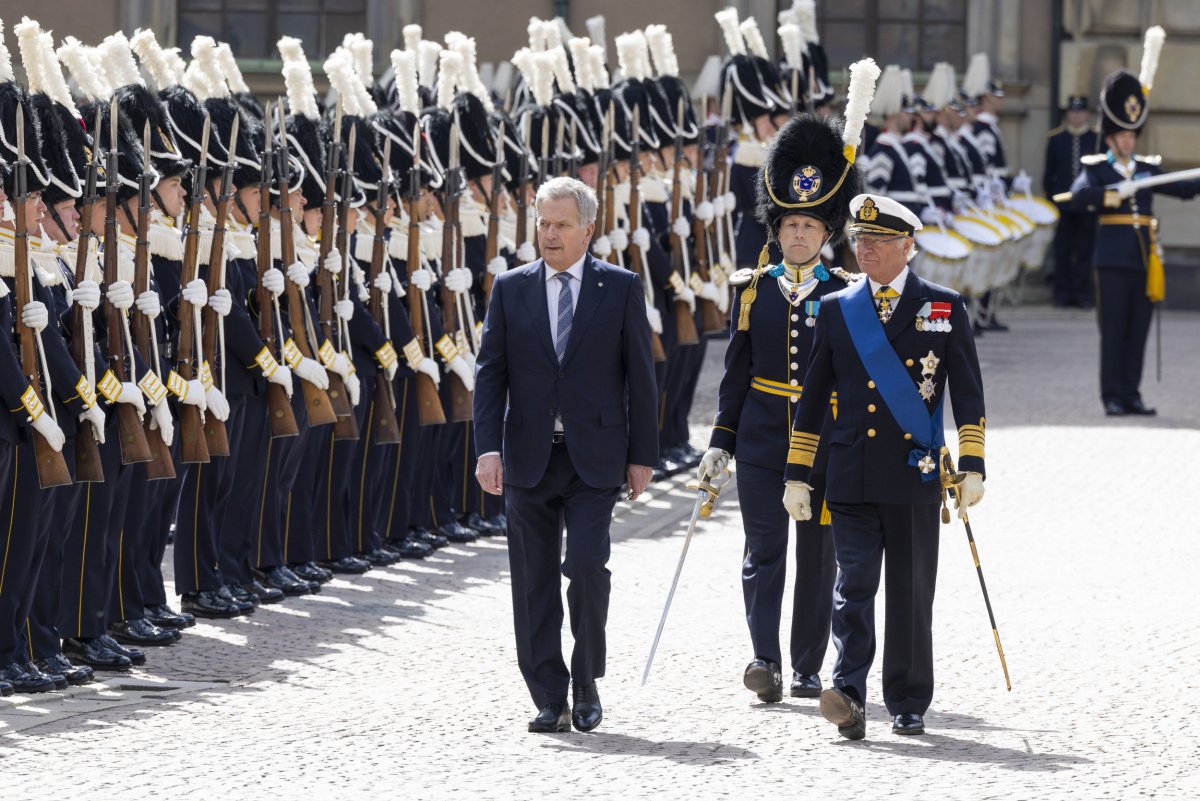As non-aligned Scandinavian states Finland and Sweden push forward with their plans to join NATO, two members of the U.S.-led NATO Western military alliance excluded from President Joe Biden's democracy summit in December are in a position to spoil the unanimous vote needed to expand the bloc.
Both Turkey and Hungary have expressed skepticism toward more aggressive NATO moves against the backdrop of longstanding Russian warnings and an ongoing conflict with neighboring Ukraine, which also sought to join the 30-state coalition ahead of Moscow's so-called "special military operation" launched on February 24.
Both nations have pursued cooperation with Moscow independent of NATO policy. While Ankara and Budapest have condemned Russian President Vladimir Putin's attack on Ukraine, they also have an ongoing gripe with Biden over being left off the invite list for his landmark Summit for Democracies in December.
The virtual gathering, which brought together more than world 100 leaders, took place amid failing diplomacy between the West and Moscow over NATO's expanding presence in Europe as well as Russia's military buildup along Ukraine's borders. Officials of both Turkey and Hungary expressed to Newsweek their criticism of Biden's decision to omit them at the time.
Now, just five months later, with Europe at war and NATO leadership praising Finland and Sweden's steps to officially seek membership, Turkish President Recep Tayyip Erdogan has already declared his intention to block their efforts.
The Turkish leader stated Friday that his country did not "hold positive views" of the bids of Finland and Sweden, based on what he sees as their lax immigration policies, which he claimed made them "guesthouses for terrorist organizations."
Erdogan doubled down on Monday following Sweden's official application and Finland's stated intention to follow suit, saying "neither of these countries has a clear, open attitude towards terrorist organizations."
Newsweek has contacted the Turkish Presidency's office and Turkey's embassy in Washington for comment.
Hungarian Prime Minister Viktor Orbán has been less vocal on the issue, though he has openly sought a more neutral stance on the Ukraine conflict, opting out of a European Union embargo on Russian oil. Orbán has also recently railed against Finland in particular over its attempts to strengthen the "rule of law" across the EU at a time when members have accused Orbán's government of undermining civil society and democratic norms.
Reached for comment, Hungarian Foreign Ministry spokesperson Sajtó Főosztály told Newsweek that Budapest had yet to make a final ruling on Finland and Sweden's membership bids, pending official NATO consultations.
"Hungary will bring a joint decision on the issue together with fellow Allies and join consensus when this item is placed on the agenda of NATO," Főosztály said.

Though December's summit snub marked a major development in Erdogan and Orbán's frictions with Biden, the roots of the tensions extend far deeper.
Under former President Donald Trump, the U.S. suspended a $1.4 billion order of F-35 jets to Turkey after the country acquired Russia's S-400 surface-to-air missile system, and the administration went on to sanction Turkey's Defence Industry Directorate along with its leadership. Erdogan called on Biden to lift the sanctions and go through with the warplane deal in March, but no known movement has been made on this front.
The Biden administration did, however, lift sanctions Thursday on foreign investment in northern Syria, a region under the control of an autonomous Kurdish-led government. While the U.S. partners with armed units here, known as the Syrian Democratic Forces, against the Islamic State militant group (ISIS), Turkey views the area and its militias as a safe haven for militants of the outlawed Kurdistan Workers' Party (PKK).
Turkey has long accused Finland and Sweden of harboring members of the PKK and other groups, including supporters of Islamic scholar Fethullah Gülen, who resides in the U.S. and is accused by Erdogan of orchestrating a 2016 coup attempt in Turkey that led to nationwide purges of public officials, civil servants and private citizens.
Turkey also has a complex relationship with Russia.
Ankara and Moscow have found themselves on opposing sides of conflicts in Syria, Libya, the Nagorno-Karabakh region disputed between Armenia and Azerbaijan, and most recently in Ukraine, where Turkey has sent Bayraktar drones to aid in the country's defense. Still, Erdogan and Putin have maintained a stable relationship, and have often opted to coordinate their rival interests in most theaters.
Orbán, on the other hand, has enjoyed warm relationships with both Trump and Putin, something Hungarian officials have accused Biden of holding against the recently re-elected right-wing leader. Orbán even invited Trump to attend a high-profile conservative conference to be held in Budapest later this week, and though the former U.S. president was not expected to attend, two of his prominent and influential supporters (and Biden's critics), talk show hosts Candace Owens and Tucker Carlson, are on the bill.
During his swearing-in ceremony Monday, Orbán touted the importance of his country's NATO membership, a process he oversaw in 1999 during his first premiership, and expressed his support for Ukraine, while at the same time accusing it of having mistreated Hungarian nationals and having interfered in Hungary's election.
He also took the opportunity to rail against how EU leadership in the Belgian capital of Brussels, also the headquarters of NATO, "abuses its power and tries to impose on us all manner of things that are bad for us and alien to us," including more liberal measures on gender equality, LGBTQ rights and immigration.
Hungary, Orban said, remained a firm believer in "Europe's Christian civilisational foundations" and the "concept of nation states, which has already been abandoned in Brussels."
Despite the divergence in views, NATO has expressed confidence that Finland and Sweden would be swiftly welcomed into the alliance.
Reached for comment, a NATO official told Newsweek that the alliance's position was "reflected in the remarks to the media made by the NATO Secretary General at the end of the recent Informal Meeting of NATO Foreign Ministers in Berlin."
NATO Secretary-General Jens Stoltenberg appeared to downplay the issue during a press conference alongside German Foreign Minister Annalena Baerbock.
"First of all, Turkey has made it clear that their intention is not to block membership, and therefore, I'm confident that we will be able to address the concerns that Turkey has expressed in a way that doesn't delay the membership or the accession process," Stoltenberg said at the time.
He said it was "still his intention to have a quick and swift process where we will then sit down with Finland and Sweden if they apply and agree the Accession Protocol, and then hope and work for a very speedy ratification process in the 30 parliaments." This step, he acknowledged "will take some time," but he said that the plan was to see that Finland and Sweden's memberships process "goes faster than we have seen before."
"So when an Ally raises concerns, we have proven over decades in NATO that we are able to sit down and then find consensus, find a way to agree, and then move forward," he added. "And that's my intention. That's my plan. I am confident that we will be able to do so also in this case because all Allies realise the historic magnitude of the moment."
The NATO official also referred to two recent tweets by Stoltenberg in which he welcomed Sweden's formal decision to apply for membership following a call with Prime Minister Magdalena Andersson, stating after a call with Foreign Minister Mevlut Cavusoglu that "Turkey is a valued Ally & any security concerns need to be addressed."

The Biden administration has also expressed confidence that the two aspiring allies would be accepted into the alliance. Secretary of State Antony Blinken told reporters Sunday that he had an opportunity to speak with his Turkish counterpart Cavusoglu during the NATO talks held over the weekend in Berlin.
And while the top U.S. diplomat declined to discuss specifics of the conversations, he asserted that he heard a "very strong consensus for bringing Finland and Sweden into the alliance if they choose to formally apply."
"And as to the differences between Turkey, Finland, and Sweden that have been talked about," he added, "there's an ongoing conversation, and the bottom line is this: When it comes to the membership process, I am very confident that we will reach consensus."
Blinken also addressed potential cracks in allied consensus stemming from Hungary and its decision to eschew EU attempts to impose a comprehensive ban on Russian oil.
"I think the lesson from the last six months is that we have seen unprecedented unity," Blinken said. "We have seen unprecedented action. And I'm very convinced that that's going to continue as long as Russia's aggression does."
State Department spokesperson Ned Price said on Monday that Deputy Secretary of State Wendy Sherman and Turkish Deputy Foreign Minister Sedat Onal "reaffirmed the strategic relationship between Turkey and the United States and discussed the two countries' many areas of bilateral cooperation" during a meeting in Washington.
"Deputy Secretary Sherman thanked Deputy Foreign Minister Onal for Turkey's strong and vocal support of Ukraine," Price said, "and discussed the need for solidarity among NATO Allies and partners in confronting Russia's premeditated, unprovoked, and unjustified attack on Ukraine and in imposing real costs on Putin and his cronies."
The Turkish Foreign Ministry acknowledged the conversations, stating that "bilateral relations, and regional issues including Ukraine, Syria and the Caucasus were discussed."
Also on Monday, the Turkish Foreign Ministry announced Cavusoglu was traveling to New York to attend the International Migration Review Forum and "Global Food Security Call to Action" Ministerial Meeting under the auspices of the United Nations. Cavusoglu was to join Blinken to co-host their first Turkey-U.S. Strategic Mechanism meeting together, providing yet another opportunity for the two men to negotiate how their nation's ties could impact NATO's future.
Meanwhile, Moscow has continued to issue increasingly stark warnings against Finland and Sweden's NATO membership bids, viewing any further expansion of the alliance, especially along Russia's borders, as a direct threat to its national security.
Putin said Monday that the expansion of NATO to include Finland and Sweden "does not create an immediate danger to Russia" as "Russia has no problems with those states." At the same time, he asserted that any "expansion of military infrastructure to that territory will undoubtedly trigger our counter-reaction."
Uncommon Knowledge
Newsweek is committed to challenging conventional wisdom and finding connections in the search for common ground.
Newsweek is committed to challenging conventional wisdom and finding connections in the search for common ground.
About the writer
Based in his hometown of Staten Island, New York City, Tom O'Connor is an award-winning Senior Writer of Foreign Policy ... Read more
To read how Newsweek uses AI as a newsroom tool, Click here.








